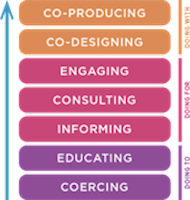Choosing to either take part in a clinical trial or join a public involvement network can be a big decision. We aim to answer some of the questions you may have about both topics below.
If you have any questions about public involvement, please contact our PPI Lead, Cat Harvey: catherine.harvey15@nhs.net.
Where do I come for my trial visits?
Your research team for your trial will give you clear instructions about where you need to come for your visits. However, most visits will take place in the King’s Clinical Research Facility. If you would like a map and Welcome Booklet posted to you, please let us know.
How do I find out about any possible side effects related to my trial?
Your research team for your trial will speak to you about any possible side effects and make sure you have enough time to understand this information before deciding whether you’d like to take part in the trial. This information should also be given to you in writing in a document called a Participant Information Sheet (PIS). The PIS should also contain information about the purpose of the trial and what the trial involves.
Who do I contact with any questions about the trial?
Your research team for your trial will give you the contact information of a designated individual. This may be a Research Nurse or a Research Practitioner who will be helping to look after you while you are taking part in the trial.
What do I do if I no longer want to take part in the trial?
You are free to withdraw from the trial at any time, without having to give a reason. You will need to let your research team know you no longer wish to participate. You can contact the designated Research Nurse or Research Practitioner on the team, or our reception staff can put you in touch with them if you are unsure of their contact details.
What does PPI mean?
PPI stands for patient and public involvement. We sometimes refer to it simply as public involvement, as the word 'public' can include patients, potential patients, carers, and people how use health and social care services.
There are a range of public involvement activities you can get involved in. These can vary from asking for your views to help us make decisions, to designing and undertaking work and research in partnership with us. We refer to these different activities as being on a 'ladder' as seen below
When we climb higher up the ‘ladder’, the more equal our relationship becomes with our PPI members. Currently, at King’s CRF, we’re at the ‘informing, consulting and engaging’ stages. As we continue our PPI journey at the King’s CRF we aspire to move further up the ladder towards ‘co-producing’.

What does co-producing mean?
Co-producing is defined by the National Institute of Health and Care Research (NIHR) as an approach in which researchers and the public work together, sharing power and responsibility from the start to the end of the of the project. The assumption is that those affected by research are best placed to design and deliver it and have skills and knowledge of equal importance.
How does PPI benefit research?
Researchers like to know how they can make their studies and research plans more accessible and beneficial to society. This is especially important in clinical research as the output of this research can influence the quality of healthcare and what treatment options are available to us, both of which ultimately influence our health.
It’s important to involve members of the public, including people living with health conditions, as researchers cannot always predict what will be most important to people. This especially applies in the case of research relating to particular illnesses as it is impossible to fully know what it is like to live with a condition unless you have been diagnosed with it yourself.
With thanks to Olivia, PPI member and author of this question and answer
How much of my time will be needed if I become a PPI member?
You can be as involved as much or as little as you’d like to be if you choose to become a PPI member. We understand that you may be busy with professional, academic, or family commitments. If you choose to become a PPI member, you will receive emails about opportunities for involvement. Each opportunity will detail how much time you’d need to set aside to take part, and you are welcome to respond to those that suit your schedule.
Can I get involved in PPI and still do my day job?
Yes, you can still do your day job whilst being part of our PPI network. If you choose to become a PPI member, you will receive emails about opportunities for involvement, and you are welcome to respond to those that suit your schedules. Some PPI opportunities may involve reviewing a document, which you can do around your day job (and you will receive payment for this).
We are aware that quite a few involvement and engagement events take place during typical working hours (9-5pm). If you’d like to be involved in a particular activity but the hours are not possible for you, please get in touch with our PPI Lead. We’d be very happy to talk to you about what reasonable adjustments we may be able to make.
Please note: if you are a taxpayer and go above the tax threshold limit due to payment from both your employer and PPI activities you need to inform HM Revenue and Customs. All payments from PPI activities are subject to tax and national insurance. For more information about PPI, finance, and tax, please see the NIHR website.
The benefits advice service, which is helpful for PPI members who have questions about how payments may or not affect their state benefits can be accessed by emailing: ced@nihr.ac.uk
Will I always be paid for my contributions and time?
For most involvement activities we will pay you for your time at a rate of up to £25 per hour. We may not be able to offer payment for activities such as attending a talk or lecture, where there is no opportunity to actively contribute to discussions. This information will always be made clear to you.
We understand that some individuals may choose not to receive payment, request payment of a lesser amount, or prefer to receive voucher(s). We will take a flexible approach and consider individuals' circumstances wherever possible.
We can also show PPI members that their contributions are valued by providing, for example, certificates of attendance, and the opportunity to include their names as authors on documents and publications they have worked on.
Do I need qualifications to be a PPI member?
You do not need formal qualifications from a school, university, or any other education provider to become a PPI member. However, we ask that you have an interest or lived experience in clinical trials, research, and healthcare to join us. You do not need a CV to become a PPI member at the King’s Clinical Research Facility.
Our activities at the moment are all conducted in English and many of them involve reading written documents that are sent via email.
Will meetings or activities take place in person or online?
We hold meetings and activities both online and face-to-face. We will try to offer certain meetings in a hybrid format (i.e., some people join online, and others join in person) if there is a demand to do so.
If the meeting is held online, we encourage you to participate in a way that feels most comfortable for you. For example, we understand that you may wish to turn your camera off or prefer to use the chat function instead of speaking out loud.
Will I always be selected for each involvement opportunity?
For most involvement activities we will pay you for your time at a rate of up to £25 per hour. For this reason, we may have limited spaces for some involvement activities to ensure we can pay you and keep within our budget. This information will always be made clear to you, and the selection criteria we use to choose individuals for the particular opportunity will also be made clear to you.
Can I request training to develop my skills?
PPI at the King’s CRF is relatively new. We are hoping to develop training for both staff and public members as part of our PPIE strategy for 2023 – 2025. If there are particular topics you’d like training on, please let us know as this may inform our future plans.
Who do I contact with any questions about PPI?
If you have any questions or feedback about PPI please contact our PPI Lead.




